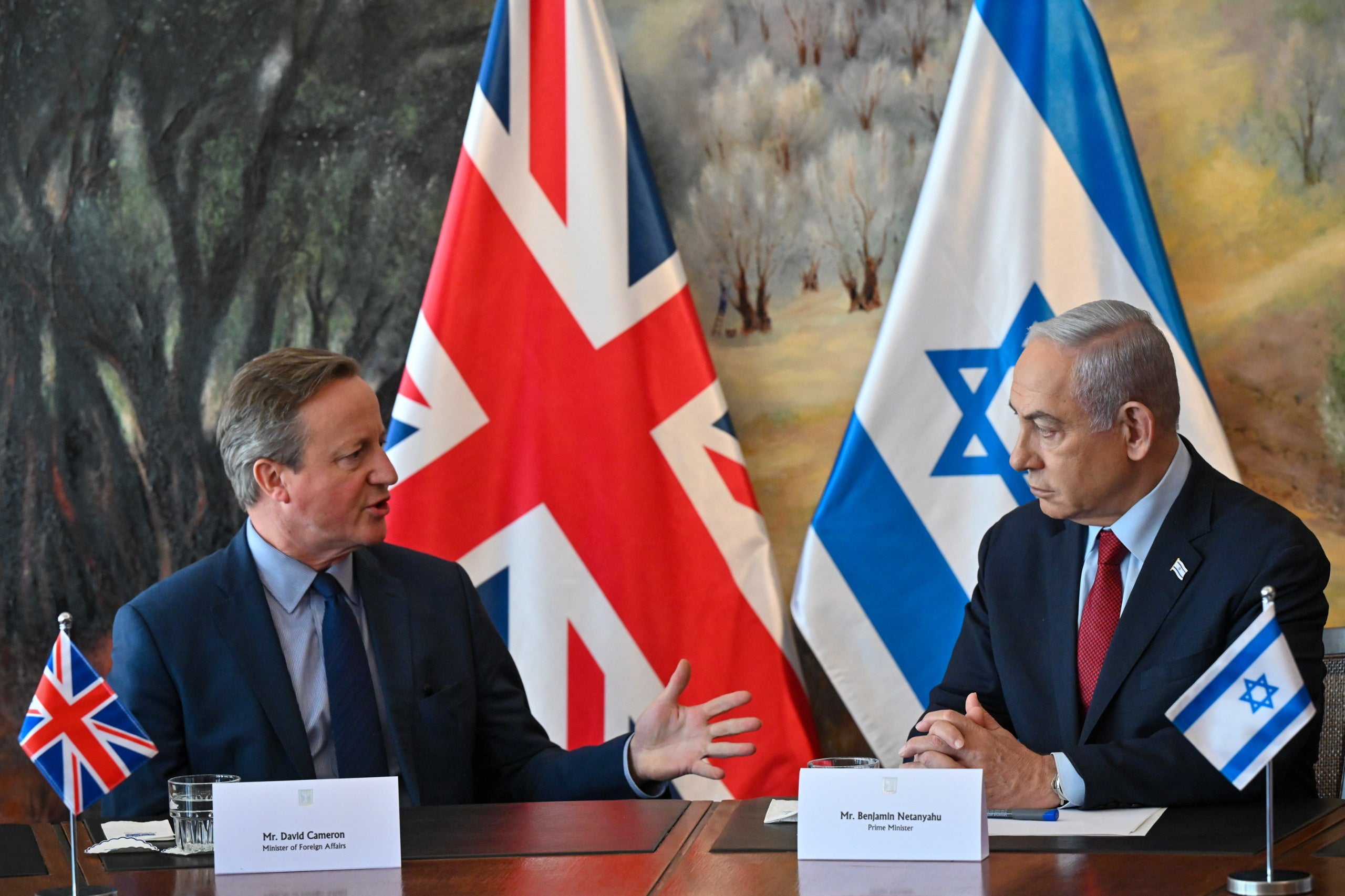David Cameron says UK will hold Iran ‘accountable for proxy attacks’ as Britain strikes more Houthi targets
Foreign secretary expresses optimism over securing pause and eventual ceasefire in Gaza, as he calls for Israel’s allies to build ‘unstoppable momentum’ towards two-state solution
Britain will hold Iran accountable for attacks by Tehran’s proxies, foreign secretary David Cameron has said, as the UK launched a third wave of strikes on Houthi targets in Yemen.
RAF Typhoons joined the United States again on Saturday in bombing Houthi sites believed to have been used to attack shipping in the Red Sea, a day after Washington struck targets in Iraq and Syria in retaliation for the drone strike which killed three American troops in Jordan last weekend.
Defence secretary Grant Shapps insisted the latest strikes – backed by Bahrain, Denmark, Canada, the Netherlands and New Zealand – were “not an escalation”, but instead were designed to “protect innocent lives and preserve freedom of navigation” in the Red Sea.

Speaking in Lebanon on Thursday, Lord Cameron said Britain needed “to send the clearest possible signal to Iran that what they’re doing through their proxies is unacceptable”.
While Iran has denied any role in the attack for which the Islamic Resistance in Iraq has claimed responsibility, Lord Cameron told the Sunday Times: “I’ve met with the Iranian foreign minister and had a very robust conversation where I said that these proxies are your proxies, you cannot disclaim your responsibility for them.
“Of course you can claim they have a certain amount of independence but you created them, you backed them, you financed them, you provided them with weapons, and you will ultimately be held accountable for what they do.”
While Britain last week sanctioned members of Iran’s Revolutionary Guard over an alleged plot to assassinate two UK-based journalists, the foreign secretary has rejected growing calls to proscribe the group as a terrorist organisation.
“The police and intelligence services are not asking for this step to be taken. As frustrating as the relationship [with Iran] can be, at least it is possible with the diplomatic relations we have to deliver a very direct message to the Iranians,” he said.

“I don’t have to ring up my French or German counterpart and get him or her to do it for me. I can do it myself. And I think that does have a value.”
Lord Cameron’s visit to Lebanon came as he touts a plan for the UK to help de-escalate rising tensions along Lebanon’s southern border, where Hezbollah has been trading intense fire with Israel ever since Hamas’s massacre on 7 October sparked the devastating ongoing war in Gaza.
“It is clear [Britain] has got assets that it can bring to bear to try and put out these fires, to try and keep Britain safe and try and make sure Britain is having a positive impact as this agile country that is small enough to be nimble but big enough to matter,” said the foreign secretary.
And he doubled down on his suggestion that the UK should look at recognising a Palestinian state, which drew a backlash from some fellow Conservatives this week, but was largely welcomed by moderates.
“We need to start setting out the political horizon,” the former prime minister said, adding: “We are trying to separate the Palestinian people from the terrorists that have been running their government in Gaza and the way to do that is to say there is a better future if you choose it.
“You have got to make the peace process better than the return-to-war process.”

While Israeli premier Benjamin Netanyahu has opposed calls for the establishment of a Palestinian state, Lord Cameron this should not prevent allies from working on the details of how a Palestinian state could operate in practical terms, in order to create “unstoppable momentum” towards a two-state agreement.
He said: “While Bibi [Netanyahu] will tell you all the things he doesn’t want a Palestinian state to be, if you turn the question around and say, well, ‘OK, I hear that, but what could a Palestinian state be? Let’s work on that bit of the picture’ … That, I think, is the way to make some progress. You have to deal with what’s in front of you.”
And Lord Cameron said he believed there was a “reasonable” chance of securing a pause in hostilities to negotiate a 40-day ceasefire which could see the 100 remaining civilian hostages in Gaza being freed.
“If we can get that pause, and I think there’s a reasonable chance of it, then I’m determined we can turn that pause into the ceasefire, into the process, into the solution. We may not get all the way there, but let’s make some steps,” he said.
“And I think the best way to do that is this phrase of creating some unstoppable momentum.”
Join our commenting forum
Join thought-provoking conversations, follow other Independent readers and see their replies
Comments
Bookmark popover
Removed from bookmarks